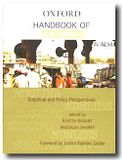Handbook of Muslims in India
Basant, Rakesh [u.a.] (Hrsg.):
Handbook of Muslims in India : empirical and policy perspectives / ed. by Rakesh Basant ... - New Delhi [u.a.] : Oxford Univ. Press, 2010. - XX, 308 S. : graph. Darst. - (Oxford handbook)
ISBN 978-0-19-806205-9 / ISBN 0-19-806205-2
Rs. 850,00
US$ 18,48 (Eastern Book Corp.)
US$ 47,00 (inkl. Airmail) (Vedams)
DDC: 305.6970954
Beschreibung
This handbook brings together the most recent work on the socio-economic conditions of the Muslim community in India, using and taking forward the debates and policy questions raised by the Sachar Committee Report (2006).
Using detailed empirical data, the handbook provides a comprehensive understanding of:
- the socio-historical context within which one must situate Muslims in India
- the demographic and educational conditions of Muslims
- the various dimensions of employment and labour market
- policy options to improve the conditions of Muslims in India
What types of affirmative actions are more desirable? Will more information on Muslims put pressure on policymakers at different levels? What is the role of community-specific and general policies/institutions in ameliorating the conditions of a community? Are minority-specific and poverty alleviation policies substitutes? The handbook explores these multifaceted issues, analysing the interplay of security, identity, and equity in the everyday life of Muslims. It highlights the heterogeneity within the community and provides a comparative analysis of Muslims vis-à-vis other socio-religious groups. [Verlagsinformation]
Herausgeber
RAKESH BASANT, Professor of Economics, Indian Institute of Management Ahmedabad.
ABUSALEH SHARIFF, Senior Research Fellow, International Food Policy Research Institute, New Delhi.
Quellen: Oxford University Press (India); Vedams Books; Eastern Book Corp.; WorldCat
Ähnlich
- Muslims in Indian Cities
- Buddhism, Modernity, and the State in Asia
- Islamicate Traditions in South Asia
- Navigating Social Exclusion and Inclusion in Contemporary India and Beyond
- The Guru in South Asia
- Guth: Die Hauptsprachen der Islamischen Welt
- Sevea: The Political Philosophy of Muhammad Iqbal
- Purohit: The Aga Khan Case
- Religion, Science, and Empire
- India's Railway History

